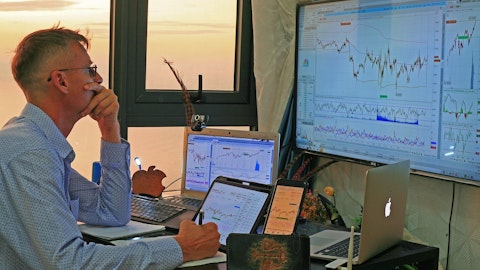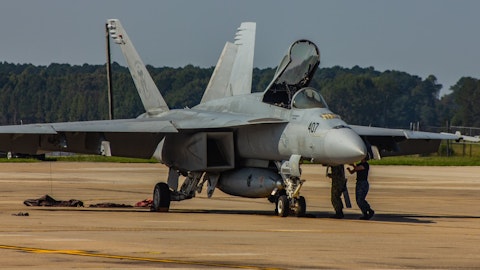Dave Burney: Yeah, the stock comp if you back out $1 million from that then the remainder should be the run rate roughly for the for the next three quarters?
Jon Tanwanteng: Got it. And then Pete is there any update on litigation and what do you think the outcomes might be?
Pete Gundermann: It’s been pretty quiet actually. I think we’re still of the premium that we’re beginning to see the light at the end of the tunnel with respect to the LHD Lufthansa saga, we’re thinking that that could and should wrap up sometime next year 2025. I’m assuming that an appeal that’s going on right now in France is not successful and we’re doing well in France, and they are appealing it, and we’re waiting for their equivalent of a high court to get involved with it. But we’re reasonably confident there, so then it’s just a matter of cleaning up issues in the UK and in Germany, and we’re thinking that should be able to happen in 2025.
Jon Tanwanteng: Okay. And then finally, just any update on the FLRAA program? I know last quarter or maybe interquarter, the Army made a decision to cancel FLRAA and maybe put more money into FLRAA. I was just wondering if there’s any change there.
Pete Gundermann: Well, we’re certainly working on FLRA, hot and heavy. We’re also still working to get a kind of an official contract in place with Bell. We are working on what they would call kind of a temporary contract to get going, but we remain very excited about the program. I think for us, the FLRAA cancellation probably was a blessing in a way because we’re busy enough with FLRAA and eVTOL and some of the other things that we’re doing for flight critical power, and we would have been a team member. We were a team member with Bell on that program also, so we would have additional duties there. And given that we have our hands full with FLRAA, we’re happy the way things are working out. We’re okay with that.
Jon Tanwanteng: Okay, great. Thank you.
Operator: [Operator Instructions]. Our next question comes from Tony Bancroft with Gabelli Funds. Please go ahead.
Tony Bancroft: Hey, thanks for taking my question, Jens. Great job managing through all the moving parts that have been going on the last couple of years. Could you just lay out for us and remind us again sort of the longer-term opportunities? I know you just talked about FLRAA there, maybe it’s just on the IFE side, power. I know that there’s been discussions with airline penalties for Wi-Fi not working. Could that positively impact you in the longer run, having more sort of higher fidelity Wi-Fi to the customers?
Pete Gundermann: Absolutely. I think it’s an interesting observation, Tony. I’ve long been of the opinion that one of the unique things about our business is the reality that consumer electronic product and technology life cycles turn really quickly compared to aerospace life cycles. And we are one of these companies where we kind of live in that junction, that space between consumer electronics and aerospace. So on the one hand, we’ve got the real quick turning things with cell phones and tablets and computers and communication and satellite connectivity. And on the other hand, we live in this world where the aerospace industry likes to be pretty conservative sometimes. And the reality is that people want to be able to do in airplanes the same kind of things they do in their living room.
And it’s hard to keep up for aerospace, which means that we always have an opportunity to kind of replace ourselves or upgrade ourselves. And that happens fairly regularly. I mean, people think of power as being a commodity-like technology, but it’s one of those things that’s not easy to do a really good job at. And you think of how a 110-volt system is turned into USB Type-A and now USB Type-C. Power is dynamic, it turns out, in consumer electronics. Same thing with wireless access points. There are increasing requirements and upgrades for security and for performance. So many of the WAPs that are out there in service right now need to be replaced, and we’re on the forefront of that also. They work fine. There’s no problem with them, except they don’t meet the current evolving requirements.
So it’s an interesting business as it grows. We’ve always looked at new markets and new customers and new penetration, but it also is one of those where we’re increasingly going to have the opportunity to replace ourselves or obsolete ourselves. And that’s a good place to be.
Tony Bancroft: Great answer. I think that’s a pretty interesting place to be. Thanks so much and great job.
Pete Gundermann: Thanks, Tony.
Operator: The conference is now concluded. Thank you for attending today’s presentation. You may now disconnect.
Follow Astronics Corp (NASDAQ:ATRO)
Follow Astronics Corp (NASDAQ:ATRO)
Receive real-time insider trading and news alerts


